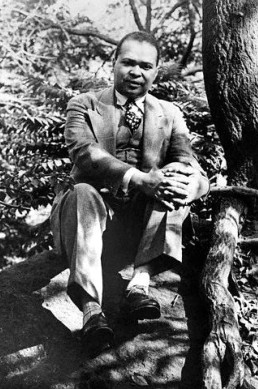
Once riding in old Baltimore,
Heart-filled, head-filled with glee,
I saw a Baltimorean
Keep looking straight at me.
Now I was eight and very small,
And he was no whit bigger,
And so I smiled, but he poked out
His tongue, and called me, 'Nigger.'
I saw the whole of Baltimore
From May until December;
Of all the things that happened there
That's all that I remember.
Heart-filled, head-filled with glee,
I saw a Baltimorean
Keep looking straight at me.
Now I was eight and very small,
And he was no whit bigger,
And so I smiled, but he poked out
His tongue, and called me, 'Nigger.'
I saw the whole of Baltimore
From May until December;
Of all the things that happened there
That's all that I remember.
Countée Cullen was a an American poet who was a leading figure in the Harlem Renaissance. He was abandoned by his mother at a young age and adopted by a reverend in Harlem and went on to graduate with a Masters in English from Harvard University.
Cullen’s poem, Incident, was written in the 1920’s and is part of a collection called color. In the poem, Cullen uses poetic devices, such as rhyme, that give the poem a light tone while portraying a heavy and critical moment in a young boy’s life. Cullen is also able to concisely express a world of emotion relating to the adversity of racism in very few words. The poem is about an eight-year old boy’s unfortunate experience on a public bus in Baltimore, yet it can also be a metaphor for the many hardships being faced by black people at the time.
As the young boy is taking in the sights and sounds of an unfamiliar yet exciting city, he is greeted by stares from another child. The other boy is about the same age and size and therefore the speaker sees little difference between the two. He smiles at the other boy, as they seem very similar and is taken aback by his racial slur. This was a defining point in this child’s life as he comes to the unfair realization that what matters most in the distinction between people in our society is race. He starts to understand the true nature of black identity for the first time and the hope of friendships is forever shattered by racism.
The poem embodies the Harlem Renaissance theme of “anger at racism.” The little boy now understands that racism exists, but does not understand why. Why there is a difference between such otherwise alike people, and why he has to be hated because of it. This poem illustrates the experience that many have had to face of growing up and having to go from a childhood naivete of race relations to ultimate resignation.
http://www.english.illinois.edu/maps/poets/a_f/cullen/life.htm
i really liked your analysis of this poem. it's cool how frank and directly it was written, it kinda reminds me of the "this is just to say" poem we read in ap class.
ReplyDeleteI remember hearing Larry Elder reciting this poem and telling a story about how his mother reacted to it.
ReplyDeleteHe came home from school deeply affected by the poem and the following classdiscussion. So he read it out loud to his mother who replied;
"What an stupid and ungrateful black boy. Getting to spend half a year i Baltimore, and letting the incounter with one stupid person ruin your trip and be the only thing you remember."